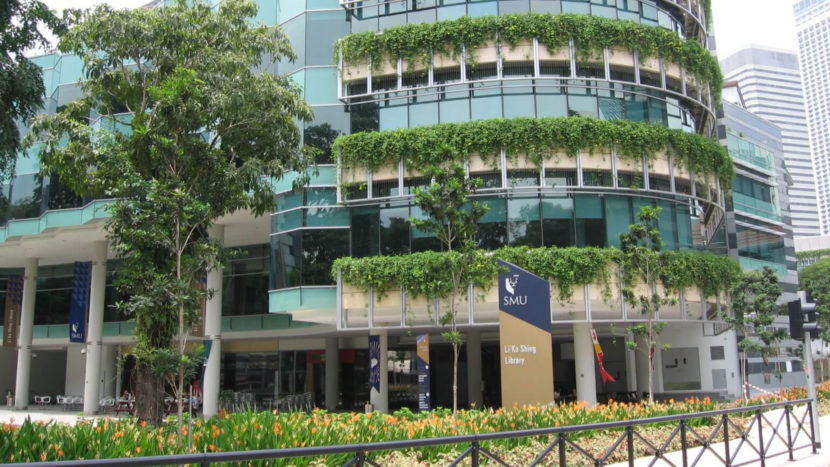About the School
MBA at NUS, The National University of Singapore’s Business School is ranked consistently as one of the top business schools in the Asia Pacific region and one of the best business schools globally. The 2019 Forbes ranking of International Two-Year MBA programmes places the NUS MBA on the 6th position worldwide.
An Overview
Rank
Class Size
Course Fee ($)
Course Duration (months)
Average GMAT Score
Average GRE Score
| Average Age | 29 |
| International Participants | 90% |
| Gender | 37% (Women) |
| Average Work Experience | 6 Years |
| Average Salary | SGD 85,321 |
Here are the specializations that you can choose from:
- Finance
- Marketing
- Healthcare Management
- Strategy And Organisation
- Consulting
- Analytics & Operations
- Digital Business
The B-school offers only one scholarship to each eligible candidate, with the exception of The NUS MBA Local University Alumni Grant. Also, please note that awards and scholarships are subject to change. The B-school announces the scholarship decisions in May (full-time MBA) and June (part-time MBA) each year.
The NUS MBA Study Awards (Dean’s/Excellence/Achiever)
The NUS MBA Diversity Scholarship
The NUS MBAScholarship For Emerging Countries Leadership
For more information on Scholarships offered by NUS please
visit:https://mba.nus.edu.sg/en-SG/fees-finances/scholarships/
NUS Business School Career Services assists you achieve your career goals, whether your objective is to improve in the same field, embark on a new career pathway, or begin an entrepreneurial venture.
Career Services initiates a wide array of exercises exclusively for MBA students. Coordinated throughout the academic year, activities cover recruitment events, networking sessions, and corporate visits, as well as on-going support to help you optimise your resumes and prepare for interviews.
94% were employed 3 months after graduation.
89% found jobs through Career Services Office and school-facilitated activities.
Average alumni salary 3 years after graduation: US$ 153,216 (FT Global MBA Rankings, 2019)
Why MBA at NUS
Notable Alumni
MBA at NUS Application Process
The latest application requirements set by the NUS MBA admission office are described below.
Essay 1: Tell us about your intermediate (3 years) post-MBA career goal, describing your industry, function and country of choice and a plan on how you would achieve this goal.
Word limit: 250 words
Essay 2: The NUS MBA offers a highly transformative education experience. What kind of transformation are you working towards in your professional and personal self?
Word limit: 250 words
Essay 3: Describe the type of leader you are right now, and the qualities of a leader you aspire to be. How would The NUS MBA help you cultivate those qualities?
Word limit: 250 words
Essay 4: Share a situation in your personal or professional life, where your value system was put to the test. How did you react, and what did you learn from it?
Word limit: 250 words
| Rounds | Application Deadlines |
|---|---|
| Round 1 | Jan 1, 2021 |
| Round 2 | Mar 31, 2021 |
Want to know more about the MBA Application Deadlines for Top B-Schools? Here’s the entire list of top B-Schools along with their deadlines – MBA Application Deadlines 2020-2021
- Two professional referee reports are needed to build your application. The referees can be your present employer, former employer or corporate client, who would be able to give an authentic professional evaluation for you. Only referee reports submitted via the MBA admissions portal through the online referee template will be acknowledged.
- The online referee form has a validity limit of two weeks upon your initiation to your referee. Both referee reports have to be given within the application deadlines for the application to be considered complete.
Tips for recommendation letters
- Who can give a recommendation: You will have to provide details of one recommender who can be your reporting manager/ previous manager/ senior colleague/ current client/ previous client/ business partner/ supplier/ auditor etc.
- It should not be a bunch of adjectives. The recommender should add specific instances / examples of your professional work together.
- Academic recommendations ( from professors / teachers etc) are not valid
- The recommender should send the recommendation from the official email id only. If the recommender does not have an official id – then a proof that you reported / or was supervised by this person should be attached.
- Go by the nature of the assessment rather than the seniority of the designation
Useful Links
| Admission Info | How to Apply | Meet NUS | Do Your Research |
|---|---|---|---|
| Admission Process | Apply Now | Student Blog | Brochure |
| MBA Highlights | Fees | Events | NUS Difference |





